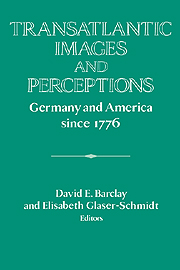Book contents
- Frontmatter
- Introduction
- 1 “Through a Glass, Darkly”: Changing German Ideas of American Freedom, 1776-1806
- 2 “Germans Make Cows and Women Work”: American Perceptions of Germans as Reported in American Travel Books, 1800-1840
- 3 Weary of Germany - Weary of America: Perceptions of the United States in Nineteenth-Century Germany
- 4 “Auch unser Deutschland muss einmal frei werden”: The Immigrant Civil War Experience as a Mirror on Political Conditions in Germany
- 5 Different, But Not Out of This World: German Images of the United States Between Two Wars, 1871-1914
- 6 From Cultureto Kultur : Changing American Perceptions of Imperial Germany, 1870-1914
- 7 The Reciprocal Vision of German and American Intellectuals: Beneath the Shifting Perceptions
- 8 Germany and the United States, 1914-1933: The Mutual Perception of Their Political Systems
- 9 Between Hope and Skepticism: American Views of Germany, 1918-1933
- 10 “Without Concessions to Marxist or Communist Thought”: Fordism in Germany, 1923-1939
- 11 The Continuity of Ambivalence: German Views of America, 1933-1945
- 12 Cultural Migration: Artists and Visual Representation Between Americans and Germans During the 1930s and 1940s
- 13 Representations of Germans and What Germans Represent: American Film Images and Public Perceptions in the Postwar Era
- 14 Chancellor of the Allies? The Significance of the United States in Adenauer's Foreign Policy
- 15 American Policy Toward German Unification: Images and Interests
- 16 Unification Policies and the German Image: Comments on the American Reaction
- Index
10 - “Without Concessions to Marxist or Communist Thought”: Fordism in Germany, 1923-1939
Published online by Cambridge University Press: 05 January 2013
- Frontmatter
- Introduction
- 1 “Through a Glass, Darkly”: Changing German Ideas of American Freedom, 1776-1806
- 2 “Germans Make Cows and Women Work”: American Perceptions of Germans as Reported in American Travel Books, 1800-1840
- 3 Weary of Germany - Weary of America: Perceptions of the United States in Nineteenth-Century Germany
- 4 “Auch unser Deutschland muss einmal frei werden”: The Immigrant Civil War Experience as a Mirror on Political Conditions in Germany
- 5 Different, But Not Out of This World: German Images of the United States Between Two Wars, 1871-1914
- 6 From Cultureto Kultur : Changing American Perceptions of Imperial Germany, 1870-1914
- 7 The Reciprocal Vision of German and American Intellectuals: Beneath the Shifting Perceptions
- 8 Germany and the United States, 1914-1933: The Mutual Perception of Their Political Systems
- 9 Between Hope and Skepticism: American Views of Germany, 1918-1933
- 10 “Without Concessions to Marxist or Communist Thought”: Fordism in Germany, 1923-1939
- 11 The Continuity of Ambivalence: German Views of America, 1933-1945
- 12 Cultural Migration: Artists and Visual Representation Between Americans and Germans During the 1930s and 1940s
- 13 Representations of Germans and What Germans Represent: American Film Images and Public Perceptions in the Postwar Era
- 14 Chancellor of the Allies? The Significance of the United States in Adenauer's Foreign Policy
- 15 American Policy Toward German Unification: Images and Interests
- 16 Unification Policies and the German Image: Comments on the American Reaction
- Index
Summary
This chapter addresses the German discussion of America during the interwar period in the context of contemporary, reactionary modernist thinking, which promoted technological progress and rationalization while radically rejecting the political ideals of the Enlightenment - freedom, equality, and fraternity. The chapter also investigates long-standing phenomena in the German-American relationship using German images of America as a guide. Although researchers like to describe the German-American relationship in the twentieth century as a dramatic lurching between war and peace, friendship and enmity, confrontation and cooperation, it is by no means clear how or whether German images of America (and American images of Germany) have been affected by the vicissitudes of political relations. Were century-old stereotypes of cultural anti-Americanism resistant to changes in the political and diplomatic relationship between the two countries? What about the traditional admiration of the Germans for the “land of unlimited opportunity” as an economic superpower? Could National Socialist propaganda be confident that the American model had lost its attractiveness as a result of the Great Depression? How did it define its own relationship to Fordism and Americanism? How did the National Socialist image of America fit into the Nazi ideology?
- Type
- Chapter
- Information
- Transatlantic Images and PerceptionsGermany and America since 1776, pp. 217 - 242Publisher: Cambridge University PressPrint publication year: 1997



